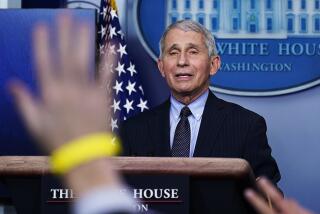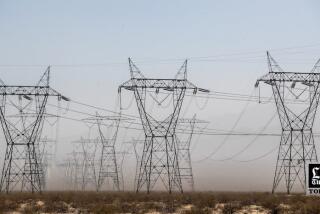Published Papers of Discredited Scientist Withdrawn
- Share via
WASHINGTON — In the largest block retraction ever published in the journal Science, eight papers by J. Hendrik Schon, the discredited researcher, are being withdrawn at the request of his coauthors.
Schon, 32, was a science superstar at Lucent Technologies’ Bell Labs. He published more than 80 papers in top journals, such as Science and Nature, and was sought out by other researchers because of his reputation for spectacular results with difficult problems in material sciences and electronics.
But when his work was questioned by other scientists last spring, an outside investigating committee appointed by Bell Labs concluded that Schon had fabricated information or altered experimental results in at least 16 projects from 1998 to 2001.
Schon, the committee found, “did this intentionally or recklessly and without the knowledge of any of his co-authors.”
At least eight of Schon’s research reports were published in Science and coauthors on the studies announced in this week’s issue of the journal that they were retracting all of the papers.
“As a result of the committee’s findings, we feel obligated to the scientific community to issue a retraction of the ... articles,” the coauthors announced.
The articles dealt with exotic electronic experiments involving such things as organic molecular semiconductors, lasers and high temperature superconductivity.
Robert C. Haddon, a professor of chemistry and chemical and environmental engineering at UC Riverside, said he agreed to become a coauthor on one paper after Schon claimed success in a superconductivity experiment that Haddon originated.
“There was an experiment I tried myself in 1996 and I couldn’t get it to work,” said Haddon. “I heard about Hendrik’s devices that seemed to work better so I suggested the experiment to him. Six weeks later, he sent me an e-mail and said he got it to work.”
After Schon sent him data that seemed to show success in the experiment, “I agreed to be a coauthor,” said Haddon.
But after the committee investigation showed Schon’s data was suspect, Haddon said he had no choice but to retract the paper.
“This data [in the paper] cannot be trusted,” said Haddon. “While some of it may be correct, one can’t be sure.”
Haddon said that when researchers combine their studies to produce a single paper, each scientist depends upon the honesty of work contributed by the other coauthors.
That, Haddon said, is the way science is supposed to work.
As the result of the questioned work, Bell Labs announced last month that it was withdrawing six patent applications that had been based on Schon’s research. Schon has made no public comment on the matter.
Bill O’Shea, president of Bell Labs, said in a statement that the Schon investigation uncovered the first case of scientific misconduct in the 77-year history of the famed research organization.
The lab, which until 1996 was part of AT&T;, has generated more than 28,000 patents in communications and electronics and was the research home of six Nobel Prize winners in physics.






